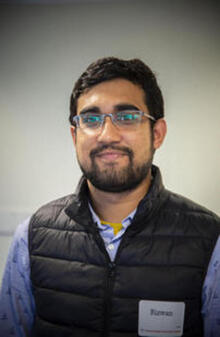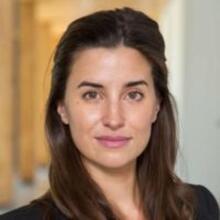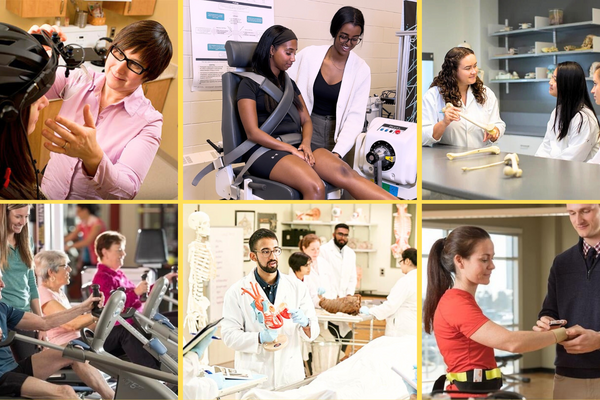
Partners in Peace
When local Rotarians created a scholarship for Waterloo students, they saw a way to further their peace-building mission

When local Rotarians created a scholarship for Waterloo students, they saw a way to further their peace-building mission
By Megan Vander Woude Office of Advancement“You have to work at peace building,” says Ernie Ginsler, a local Rotarian and Chair of the Peace Committies for his Rotary Club and District. “You need to understand that there are certain things a community or country can do to increase the level of peace. And there are things they can do to decrease the level of peace too.”
Like many Rotarians, Ernie dedicates his time to creating peace and improving lives around the world. Rotary is the world’s oldest and largest non-profit international peace organization, uniting people to take action – across the globe, in their own communities and within themselves.
One of Rotary’s major peace-building initiatives is the creation of Rotary Peace Centres. The centres are located in areas with academic institutions that offer research and academic programs related to peace.
“Peacebuilding works best when there’s empirical evidence about what works and what doesn’t,” explains Ernie. “The only way to get that empirical evidence is to have people study peace and conflict. Then, those experts have to go to the places where they can put their knowledge into action. That’s how the Rotary Peace Centres make an impact.”
Inspired by the Rotary Peace Centres, Ernie saw an opportunity to partner with academic institutions in the Waterloo Region. With financial support from his fellow Rotarians in Kitchener-Waterloo, Ernie helped to create the Rotary Peace Scholarship Awards, which support Conrad Grebel and University of Waterloo graduate students every year.
Since 2015, more than $150,000 has been raised to support the scholarships -- by 5 Rotary clubs in Kitchener-Waterloo and individual rotarians. To date, 16 students have received the awards. Many of these students originate from areas of conflict, and all of them contribute to global peace-building through research or pursuits in their careers.
 Rizwan Shoukat is a Christian peace activist, a current student in the Master of Peace and Conflict Studies (MPACS) program, and a Rotary Peace Scholarship recipient.
Rizwan Shoukat is a Christian peace activist, a current student in the Master of Peace and Conflict Studies (MPACS) program, and a Rotary Peace Scholarship recipient.
After experiencing targeted violence due to religious intolerance, he became a peace-builder in his home country of Pakistan. His mission is to promote respect and diversity by advocating for human and minority rights. After graduation, he plans to return to Pakistan and establish a peace resource centre in his home community.
RIZWAN, Scholarship recipient
These studies improve my skill and perspective and help me deal with countering violent extremism and intolerance in Pakistan.
 Bryn McAuley is a current student in the Master of Global Governance program, and a Rotary Peace Scholarship recipient. During her undergraduate studies at Ryerson University, Bryn assisted more than 15 Syrian refugee families during their first year in Canada, as part of Ryerson’s Lifeline Syria Challenge. While working with these families, she facilitated employment and extracurricular opportunities, and managed one-on-one mentoring.
Bryn McAuley is a current student in the Master of Global Governance program, and a Rotary Peace Scholarship recipient. During her undergraduate studies at Ryerson University, Bryn assisted more than 15 Syrian refugee families during their first year in Canada, as part of Ryerson’s Lifeline Syria Challenge. While working with these families, she facilitated employment and extracurricular opportunities, and managed one-on-one mentoring.
BRYN McAULEY, Scholarship recipient
The Rotary Peace Scholarship has allowed me to research innovative solutions to the challenges of refugee protection.
Inspired by this experience, Bryn’s current research is focused on refugees and forced migrants, and the mechanisms that developed states use to limit their Refugee Convention obligations.
“I believe very deeply in the moral duty to provide asylum to someone whose homeland has been destroyed or whose life is in danger,” explains Bryn. “Canadians have this duty because we are fortunate to have a safe home.”

Read more
A Waterloo couple reflects on the campus that shaped their careers, their values, and their love story

Read more
To meet our AI ambitions, we’ll need to lean upon Canada’s unique strengths

Read more
From optometry and pharmacy to public health and therapeutics, Waterloo alumni are powering Canada’s health care sector
The University of Waterloo acknowledges that much of our work takes place on the traditional territory of the Neutral, Anishinaabeg, and Haudenosaunee peoples. Our main campus is situated on the Haldimand Tract, the land granted to the Six Nations that includes six miles on each side of the Grand River. Our active work toward reconciliation takes place across our campuses through research, learning, teaching, and community building, and is co-ordinated within the Office of Indigenous Relations.